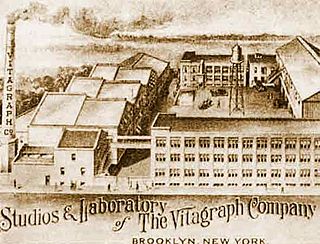
Vitagraph Studios, also known as the Vitagraph Company of America, was a United States motion picture studio. It was founded by J. Stuart Blackton and Albert E. Smith in 1897 in Brooklyn, New York, as the American Vitagraph Company. By 1907, it was the most prolific American film production company, producing many famous silent films. It was bought by Warner Bros. in 1925.
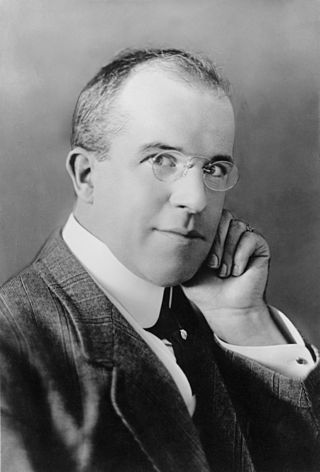
James Stuart Blackton was a British-American film producer and director of the silent era. One of the pioneers of motion pictures, he founded Vitagraph Studios in 1897. He was one of the first filmmakers to use the techniques of stop-motion and drawn animation, is considered a father of American animation, and was the first to bring many classic plays and books to the screen. Blackton was also the commodore of the Motorboat Club of America and the Atlantic Yacht Club.

Harry Reichenbach was a US press agent and publicist who staged sensational publicity stunts to promote films. He was one of the founding members of the Associated Motion Picture Advertisers.

John Bunny was an American actor. Bunny began his career as a stage actor, but transitioned to a film career after joining Vitagraph Studios around 1910. At Vitagraph, Bunny made over 150 short films – many of them domestic comedies with the comedian Flora Finch – and became one of the most well-known actors of his era.

Lule Warrenton was an American actress, director, and producer during the silent film era. She appeared in more than 80 films between 1913 and 1922. She was born in Flint, Michigan and died in Laguna Beach, California and was the mother of cinematographer Gilbert Warrenton.
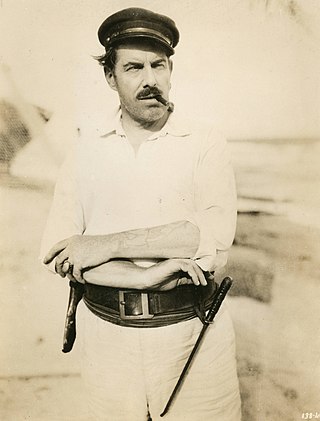
Harry Temple Morey was an American stage and motion picture actor who appeared in nearly 200 films during his career.

A Yankee Princess is a 1919 American silent comedy-drama film produced and distributed by the Vitagraph Company of America. It was directed by David Smith and stars Bessie Love, who also wrote the screenplay. It is a lost film.

The Dawn of Understanding is a lost 1918 American silent Western comedy film produced by The Vitagraph Company of America and directed by David Smith. It stars Bessie Love in the first film of her nine-film contract with Vitagraph. It is based on the short story "The Judgement of Bolinas Plain" by 19th-century Western writer Bret Harte.

A Cure for Pokeritis is a 1912 short silent film starring John Bunny and Flora Finch. After Bunny's death in 1915, a re-release was announced with the alternative title A Sure Cure for Pokeritis. The film, a domestic comedy, depicts a woman who stops her husband's gambling habit by having her cousin stage a fake police raid on his weekly poker game. It was one of many similar shorts produced by Vitagraph Studios—one-reel comedies starring Bunny and Finch in a domestic setting, known popularly as "Bunnygraphs" or "Bunnyfinches"—whose popularity made Bunny and Finch early film stars. The film has been recognized as an historically important representative of its period and genre.

The Little Boss is a 1919 American silent romantic comedy film directed by David Smith and produced by Vitagraph Studios. The story and screenplay were by Rida Johnson Young, and it starred Bessie Love and Wallace MacDonald.

The Actor and the Rube is a 1915 American silent short film produced by the Thanhouser Company under the Falstaff brand. Written by Philip Lonergan and directed by Arthur Ellery, this was the first Falstaff release. The production was supervised by Edwin Thanhouser and produced at the New Rochelle studios. The plot of the film is about a cranky farmer, who, disliked by his entire town, decides to head to New York City. An actor disguises himself as the farmer and returns to the farmer's village and makes him popular. After his work is done, the actor tells the farmer to return home and the farmer finds he is well-liked and marries his love interest. The one reel comedy production saw a wide United States release and was also released in the United Kingdom under an alternate title, The Actor and the Bumpkin. Reviews were positive and focused on good acting and originality in the execution of a plot, with the New York Clipper finding it a welcome relief from the "pie-smashing" antics of other comedies.

My Official Wife is a 1914 American silent film directed by James Young and starring Clara Kimball Young, Harry T. Morey and Rose E. Tapley.

The Absentee is a 1915 American silent allegory film directed by Christy Cabanne and starring Robert Edeson, A. D. Sears, and Olga Grey. It was released on May 8, 1915.

Earl Triplett Montgomery was a film director, writer, and comedian who performed in silent films including as the character Hairbreadth Harry. He established the producing company Earl Montgomery Comedy Company. Joe Rock partnered with him at Vitagraph.
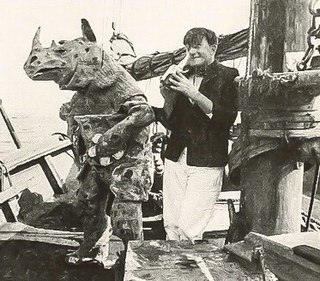
The Ringtailed Rhinoceros is a lost 1915 American silent comedy-drama film that depicted the ruinous effects of alcohol on a good-natured man and on the lives of the people around him. Like snakes and "pink elephants" that have been used in many societies to symbolize heavy drinking or been associated with the hallucinations of drunkards, the main character in this "'photophantasy'" blamed instead a "Ringtailed Rhinoceros" for his excessive use of wine and liquor.
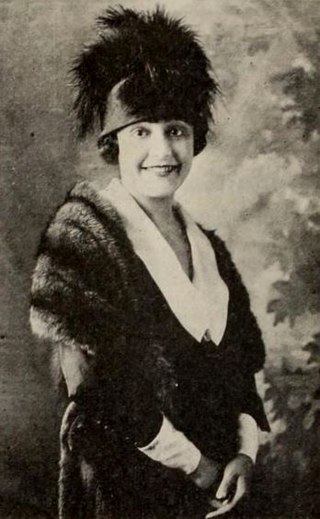
Betty Howe was an American actress in silent films.
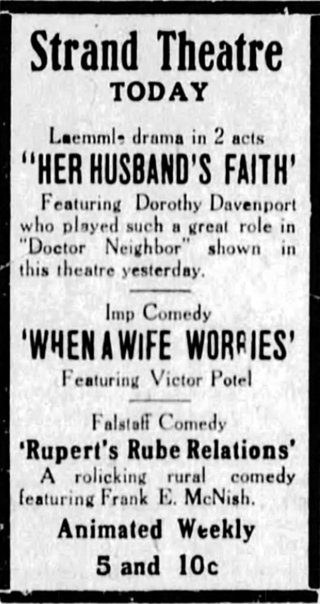
Her Husband's Faith is a 1916 American silent short film directed by Lloyd B. Carleton. The film is based on a story by Paul Machette. Eugene De Rue developed the screenplay. This domestic society drama's features Dorothy Davenport, T. D. Crittenden and Emory Johnson.
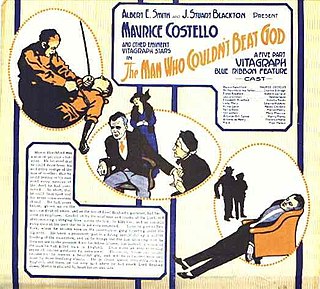
The Man Who Couldn't Beat God is a 1915 American silent film written by Harold Gilmore Calhoun and directed by Maurice Costello and Robert Gaillard. It stars Maurice Costello, Robert Gaillard and Mary Charleson.

The Wheels of Justice is a 1915 American silent film written by Edward J. Montagne, directed by Theodore Marston, and starring Dorothy Kelly, James Morrison and Louise Beaudet. It premiered in February 1915, before its wide release in August of the same year. It was met with mostly positive reviews.
The Surprises of an Empty Hotel is a 1916 American silent film written by Jasper Ewing Brady, directed by Theodore Marston, and starring Charles Richman, Charles Eldridge and Leo Delaney.




















